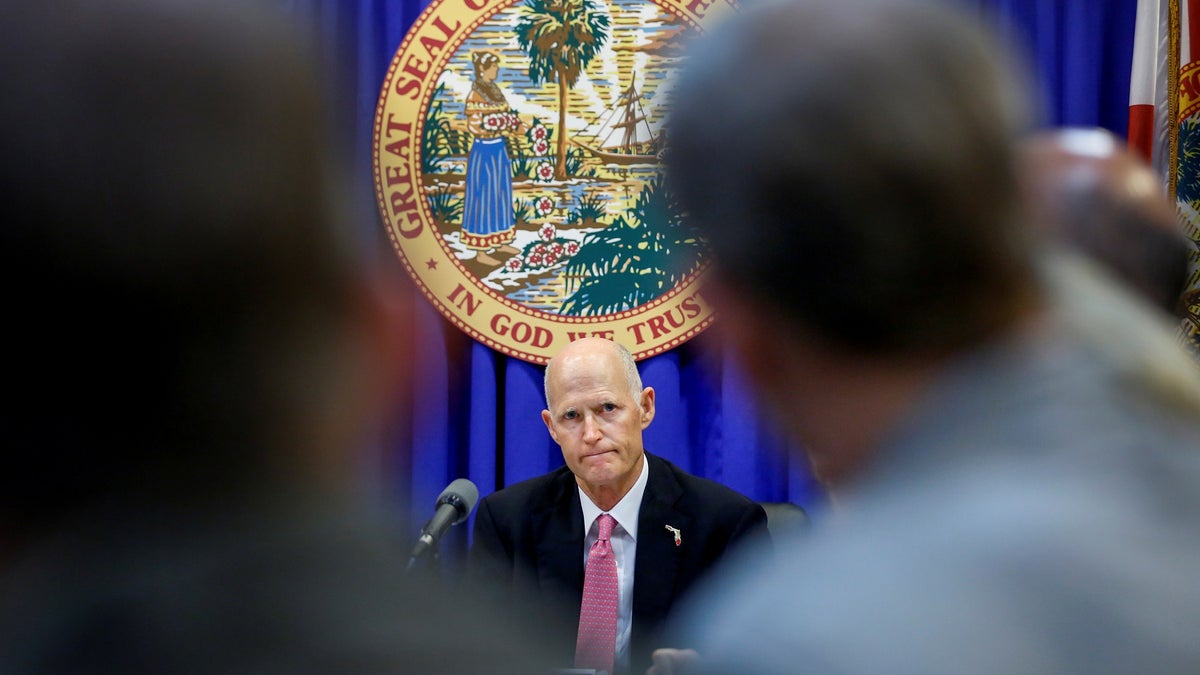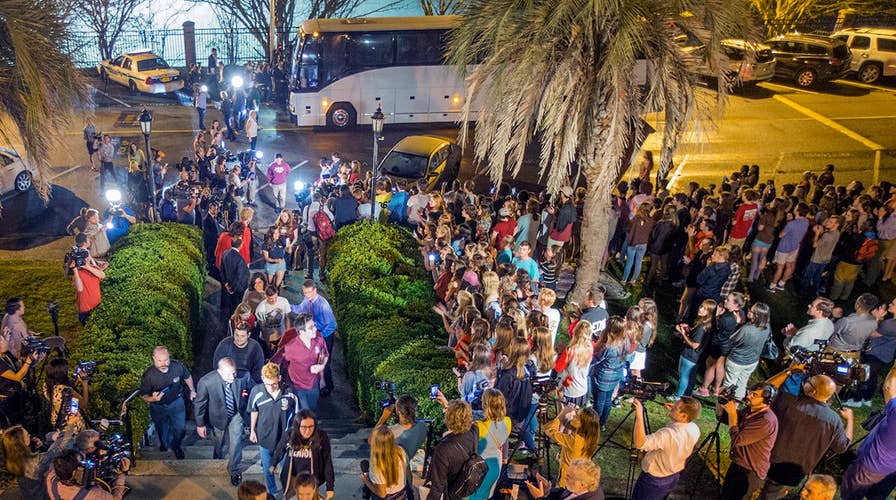Parkland students march to Florida capitol building
Parkland, Florida students are calling for a ban on assault rifles and gun reform.
Florida Gov. Rick Scott unveiled a $500 million "action plan" to prevent gun violence Friday – more than a week after 17 students and faculty members were brutally gunned down at a local high school.
The Republican governor’s plan does not include a ban on specific weapons, but it does aim to raise the minimum age to purchase a gun to 21 years old, establish law enforcement officers and mental health counselors in Florida’s schools and vastly restrict mentally ill people from accessing firearms.
Scott began a press conference Friday by reading the names of the 17 shooting victims from Marjory Stoneman Douglas High School in Parkland.
“Unfortunately, none of the plans I’m announcing today will bring any of them back, but it’s important to remember them,” said Scott, adding he would work with the state legislature “aggressively over the next two weeks” to implement his ideas.
Here’s a look at seven things Scott’s proposal would do.
Raises minimum age to purchase a gun to 21
It would prohibit anyone under the age of 21 from purchasing or possessing a firearm.
There would be exceptions for certain individuals, however, including: National Guard members, active duty service members and law enforcement officials.
He said his plan would ban bump stocks, but would not prohibit specific firearms, such as the AR-15 – the type of semi-automatic rifle shooting suspect Nikolas Cruz used.
Bans guns for those with mental illnesses
People with a mental illness will not be able to purchase or possess a gun, Scott said.
"I want to make it virtually impossible for anyone who has had mental issues to use a gun."
“I want to make it virtually impossible for anyone who has had mental issues to use a gun,” Scott said Friday. “I want to make it virtually impossible for anyone who is a danger to themselves or others to use a gun.”
His plan creates what he calls the “Violent Threat Restraining Order,” which gives family members, welfare experts or law enforcement officials the ability to inform a court that a person’s firearms may need to be confiscated or the person should be blocked from purchasing a weapon.
The family member, welfare expert or law enforcement official would sign a sworn statement and provide evidence “of a threat of violence involving firearms or other weapons to a court,” Scott explained.
“There would be speedy due process for the accused and any fraudulent or false statements would face criminal penalties,” he added.
His plan also places restrictions on gun purchases by people who have been subject to the Baker Act, a state law that allows people to be involuntarily committed.
Places law enforcement officers in schools
Scott’s plan – which provides $450 million to schools – would place at least one law enforcement officer at every school. He suggested one officer for every 1,000 students be in place by the start of the 2018 school year.
Sheriff’s departments would be permitted to offer training for school personnel or reserve law enforcement officials in protection measures upon a school's request. And the Department of Homeland Security’s active shooter trainings would become mandatory.
Funding will also be increased in order to provide “school hardening measures,” such as: bullet-proof glass, metal detectors, steel doors and new locks.
Marjory Stoneman Douglas High School had one armed resource officer on staff at the time of the shooting. But Broward County Sheriff Scott Israel said the officer “never went in[to]” the building during the deadly rampage.
During a press conference, Scott said he did not agree with arming teachers.
Establishes mental health counselors at schools

Florida Gov. Rick Scott listens during a meeting with law enforcement, mental health, and education officials about how to prevent future tragedies in the wake of the deadly school shooting earlier this month. (Reuters/Colin Hackley)
Scott’s proposal allocates funding to place mental health counselors at every school.
“These counselors cannot serve dual roles, like teaching or academic advising,” Scott said. “Every student must have the opportunity to meet one-on-one with a mental health professional, and receive ongoing counseling as needed.”
Restricts gun access to those who have committed acts of domestic violence, stalking
“We will prohibit a person from possessing or purchasing a firearm if they are subject to an injunction for protection against stalking, cyberstalking, dating violence, repeat violence, sexual violence or domestic violence,” Scott said.
Those who make shooting or bomb threats to schools will face a harsher penalty, he added.
Provides $50 million for mental health initiatives
“We must expand mental health service teams statewide to serve youth and young adults with early or serious mental illness by providing counseling, crisis management and other critical mental health services,” said Scott, announcing he would allocate $50 million for additional mental health programs.
Establishes new ‘see something, say something’ hotline
The governor’s plan would also establish a new, anonymous statewide hotline – online, on the phone and through an app.
Days after the shooting, Scott slammed the FBI for failing to follow up on a tip that expressed concerns about Cruz's erratic behavior and disturbing social media posts. He called for the resignation of FBI Director Christopher Wray and promised an immediate investigation.
"We constantly promote ‘see something, say something,’ and a courageous person did just that to the FBI," Scott said in a statement last week. "And the FBI failed to act. ‘See something, say something’ is an incredibly important tool and people must have confidence in the follow through from law enforcement.
The Associated Press contributed to this report.













































